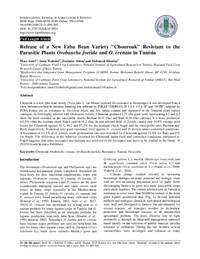Release of a New Faba Bean Variety "Chourouk" Resistant to the Parasitic Plants Orobanche foetida Poir. and Orobanche crenata Forsk. in Tunisia

Authors:
The broomrapes (Orobanche spp. and Phelipanche spp.) aretroublesome holoparasitic plants, completely dependent on their hosts for their nutritional requirements; water and nutrients. Orobanche crenata,O. cumana, O. foetida, O. minor,Phelipanche aegyptiaca andP. ramoseare the most economically damaging species and cause severe yield losses on many crops especially in the Mediterranean region. In Tunisia, O. foetida, O. crenata, O. cumana,and P. ramosawere found parasitizing many cultivated crops (Kharrat et al.,1992; Kharrat, 2002; Amri etal.,2012, 2013). O. crenatawas mentioned for a long time as a serious problem for many legume crops in Tunisia, but O. foetidahas been described as an emerging problem for legume production especially faba bean (Kharrat et al.,1992; Kharrat, 2002). Nowadays, O. foetida andO. crenata have become major problems not only for faba bean but also for many other legume crops such as chickpea (Cicer arietinumL.), lentil (Lens culinaris Medik.), grass pea (Lathyrus sativusL.), medick (Medicago truncatulaand M. scutellata), common vetch (Vicia sativaL.) and narbon vetch (Vicia narbonensis L.) (Nadal et al.,2008; Trabelsi et al., 2016).Climate change resulted recently in increasing broomrape damages on many potential and strategic crops with an ever-increasing infestation level of many fields discouraging farmers to grow any more susceptible crops particularly legumes. The current infested area in Tunisia is estimated to cover more than 50,000 ha located in the main grain legume production area (Fig. 1). Several potential methods and strategies; chemical, agricultural and biological were used and divulgated to farmers but unfortunately for several reasons, all strategies resulted in incomplete protection and broomrape remains as an uncontrolled agricultural problem. The most effective way to fight orobanche is through an integrated management approach based mainly on the selection of genetic material carrying tolerance to orobanche. During the last decades, several varieties/lines were developed and released in many countries; Baraca, VF1071, VF136 and VF172 in Spain, Giza 4, Giza 842, Sakha, Misr1 (667/153/87), Misr3(X-1722) and Cairo 4, Cairo 5 and Cairo 25 in Egypt (Abdallaand Darwish, 2008; Attia et al.,2013; Rubiales et al., 2014). Numerous studies showed that different mechanisms were involved in the resistance such as low number of underground and emerged orobanche, reduced seed germination stimulant production, host plant root architecture and physical barrier (Perez-De-Luqueet al.,2005; 2006a; Abbes et al., 2010; 2011; Fernandez-Aparicioet al., 2014; Trabelsi et al., 2015, 2017).In Tunisia, a breeding program aiming to the development of faba bean varieties tolerant to O. foetida was initiated during the past several years at the Institut National de la Recherche Agronomique de Tunisie (INRAT). The first partially resistant faba bean cultivar (‘Najeh’) was realesed in 2009 and registered it in the Tunisian Official Catalogue of Plant Variety (Kharrat et al., 2010). In 2014, a new faba bean small seeded variety "Chourouk" (XAR-VF00.13-10-2-3-1-2-1) was registered also in the Tunisian National Plant Variety Catalogue (JORT N°42, May 26th, 2015; COV N° 117, March 02nd, 2015). It was developed from a cross performed by INRAT (National Institute for Agricultural Research of Tunisia) at Ariana, Tunisia in 2000 and selected after several years of single plant selection in different orobanche infested plots. The purpose of the present research work was to report the performances of the newly developed variety Chourouk under field and controlled conditions.
